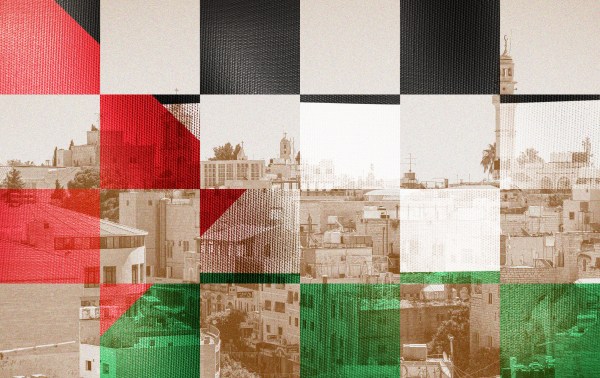Hollywood screenwriter William Goldman once said, “Nobody knows anything.” He meant that there were no reliable rules about how to make a successful movie because audiences were fickle and the film industry unpredictable—but his insight was truer than he knew. If no one knows anything about making hit movies, we know even less about the vagaries of human politics, especially international politics.
I want to make an argument about Israel and the Palestinians. The main point is that no one knows anything—that you, dear reader, know less than you think you know—because it is almost impossible to trust any information about the war in Gaza and because of the power of narratives in shaping how we think about it. But to get there, I need to take a detour to talk about the nature of knowledge.
You and I really don’t know much of anything at all—not about movies, war, or the biological life cycle of fruit flies. I don’t really know, for example, that Mars exists. I’ve never been there, never seen it, never touched it. I believe it is there because scientists tell me so, and I have no reason to disbelieve the story they tell about a nearby planetary body. It seems consistent with all the other things they say about physics and astronomy. If I took issue with the existence of Mars, I’d really be taking on the entire astronomical establishment, claiming that, for whatever reason, I know better about telescopes, gravity, and shining lights in the sky than they do. That just seems implausible on its face. I believe in Mars because I trust the broader story of astronomy and physics.
Similarly, few of us actually know much about Israel or Gaza or the West Bank. Maybe some of you have visited. (I haven’t, yet.) I’ve read a good amount about the region—more than the average citizen, less than a specialist scholar—but even then, I’m trusting in the authority of the authors. I read newspapers and magazines, but they often conflict with each other. So which books and newspapers do we believe?
We believe the ones that seem most consistent with the broader stories we already trust in, the ones that feel consistent with our preconceived judgments. Just like I believe in Mars because I trust the broader fields of astronomy and physics, we form our beliefs about Israelis and Palestinians depending on broader stories of justice, history, and politics that we already believe in. You might believe in a story about imperialism and occupation, and thus be predisposed to be pro-Palestinian; or perhaps you believe a story about God’s favor for his chosen people, in which case you are predisposed to be pro-Israel.
Don’t worry, I’m not going full postmodern here. I do believe in objective truth, and I do think we can know real things with certainty. I’ll get there. My point so far is that, most of the time, our knowledge rests on which authorities we chose to trust and what stories they tell. So we should ask: Where do those bigger narratives come from, what are they, and are they any good?
The narratives come from the knowledge-producing, meaning-creating parts of society: journalists and universities, churches and political parties, Madison Avenue and Hollywood. They are all, in different ways, competing in a marketplace of stories, each with a different claim about why their story is the most reliable. Tell me which storytellers you listen to, and I’ll tell you how you vote and what you think about Israel and the Palestinians.
The left’s changing narratives about Israel.
The left has told a couple of stories consistently since the 1960s. Arguably, the single most defining story among them is that power needs critique: Powerful people should not be trusted, they are usually corrupt or abusive while the powerless are noble victims who need our help. (Of course, this is never true when the left is in power.)
That philosophy explains a lot of the left’s changing narratives about Israel. Coming out of World War II and the Holocaust, Jews were the powerless, the disenfranchised, the victims par excellence. There was a lot of leftist sympathy for Zionism (it didn’t hurt that a lot of early Zionists were also socialists). Postwar leftist sympathy for Israel lingered for two decades, all the way to the Six-Day War of 1967, as Israel was seen as a precarious experiment in a hostile neighborhood surrounded by more powerful neighbors.
That view changed overnight after Israel single-handedly defeated Egypt, Jordan, and Syria and made it look easy—and then occupied the West Bank and Gaza. Since 1967, the left looks at the region and applies a simple formula: Israel is powerful, the Palestinians are not. Israel is the villain, Palestinians are the victim. Israel is the evil overlord, Palestinians are the heroic resistance.
That was enough to make any leftist more sympathetic to Palestinians than to Israel. But the left’s story about Israel doesn’t stop with the crude power/powerless narrative. There are two more layers.
The left also tends to view Israel as another chapter in the long story of imperialism. Israel is a “settler colonial” state guilty of displacing indigenous people (the Palestinians), just as white Europeans displaced Native Americans and just as British people displaced Australia’s aboriginal people. Israel is imperialist, Palestinians are indigenous—and the indigenous rebels are always the good guys in that story.
Relatedly, Israel is “white” and the Palestinians are “nonwhite” or lumped in with the “Global South” or “people of color.” In this story, the conflict maps easily onto America’s white/black racial dynamics. Some writers have made the comparison explicit. It amounts to a claim that nonwhite people are uniquely virtuous by virtue of not being white, and that all nonwhites everywhere should stand in solidarity with each other.
“In the power/powerless framing, anyone who succeeds in defending themselves—and therefore gaining power—automatically becomes a bad guy, while the loser is the new good guy. But if, heaven forbid, the newly minted tragic heroes someday succeed, are they now the bad guy?”
So here is the point: If you already believe that Israel is a powerful, imperial, white ethno-state whose existence is an intrinsic aggression against a powerless, indigenous, nonwhite people, you already “know” what the Israel-Hamas war is about, without ever having to read facts about it. When something happens like the explosion at al-Ahli Arab Hospital in Gaza City on October 17, 2023, you are almost cognitively incapable of even considering the possibility that it wasn’t the evil Israeli empire responsible for hundreds of Palestinian deaths. You already “know” who to blame, even though, as it turns out, you were wrong.
To be fair, the same is true, to a lesser degree, in some corners of the right. Some Christians still tell a story about Israel drawn from the Old Testament. The refounding of Israel in 1947 is a divine miracle and a fulfillment of biblical prophecy, proof of God’s faithfulness to his chosen people. God promised to bless those who bless Abraham, and to curse those who curse Abraham. In this reading, Israel is definitionally the good guy; anyone who opposes Israel merits God’s curse. Again, you already know everything you need to know, instantaneously, without learning anything new.
A simplistic and crude framing.
It’s almost too easy to poke holes in the left’s narratives. The power/powerless framing is simplistic and crude. Not all powerful people are evil, not all powerless people are innocent. Power is necessary to keep order and execute justice; the powerless, being human, are just as capable of wickedness and evil—for example, by committing terrorism and taking hostages. Power does not make a person evil; it simply magnifies the effects of one’s choices. Those choices are often evil, because humans are sinful, but at other times they are necessary and just, because humans are also capable of reason and goodness.
It is baffling that the left holds Israel’s victory in 1967 against it, as if Israel is somehow blameworthy for winning a war. Maybe we should ask if the war was justified? I’m happy to share my own view (the war, yes; the postwar occupation, less so). It is the paradigmatic case for a justified war of preemption, considering Egypt blockaded an Israeli port and explicitly disavowed negotiations and peace. But the point is that we should actually ask the question, rather than make assumptions based on a crude and simplistic argument based on which side has more power.
In the power/powerless framing, anyone who succeeds in defending themselves—and therefore gaining power—automatically becomes a bad guy, while the loser is the new good guy. But if, heaven forbid, the newly minted tragic heroes someday succeed, are they now the bad guy? You see the problem. It’s a never-ending cycle of good and bad without any reference to what anyone was fighting for or against. It’s a morally arbitrary way to pick a side.
The imperial/indigenous framing is more complex, but still wrong. Zionism is not the same thing as imperialism, and Israel is not a settler-colonial state—but even if we grant the premise, that does not automatically make the Palestinians heroes. In theory, both sides might be villains in different ways. The left has a weird fetish for rebels and national “liberation” movements, in the name of which they’ve spent a century turning a blind eye to or excusing war crimes, terrorism, and ethnic cleansing done by all kinds of ghastly movements so long as they were done in the name of liberation, self-determination, or class revolution. Just look up the history of the Algerian National Liberation Front during its war against France in the 1950s and 1960s. Or the the Mau Mau fighters in Kenya, or Colombia’s FARC, or the Vietcong. Examples abound.
And Israel isn’t white or European; an equal number of Israeli citizens are descendants of immigrants from Africa and Asia as from Europe. It is a multiethnic state (including 20 percent who are Arab). And, to be clear, it wouldn’t be a crime if the population were primarily European. Identifying good guys and bad guys by their ancestry or the color of their skin is, the last time I read the dictionary, racist. If your politics consists of measuring shades of skin tone to figure out who to root for, you are bad at politics. Politics is more complicated than a broad white/nonwhite dichotomy.
That’s my beef with these narratives. The stories insist on simplifying, turning complex political events into morality plays with heroes and villains with big name tags. That makes it so much easier to know which tribe to root for, like the old Westerns where the good guys wear white cowboy hats and the bad guys wear black.
It is part of the “MacGuffinization of politics,” or the “Marvelization of reality.” We expect reality to conform to the story arcs of fiction. There’s a protagonist (the Palestinians), there’s a goal (statehood and liberation), a villain (Israel), a moment of conflict and rising tension (war!), and the script writes itself. Flip the script to make Israel the hero and it is still a simplistic, Marvelized reality.
That’s why I say that we don’t really know what we’re talking about. When we filter the news through these stories—and it is almost impossible not to—we filter out facts in favor of the narrative. We make ourselves dumber when we can’t break out of the narrative and look at what facts really say.
Not even William Goldman, the screenwriter who insisted on our universal ignorance, could escape the irresistible draw. He wrote the screenplay for the Oscar-winning Western Butch Cassidy and the Sundance Kid. In most respects Goldman subverted typical Western tropes by celebrating its anti-hero protagonists, outlaws on the lam after a train robbery gone wrong. But he kept one trope: Butch and the Kid dutifully wore their black hats, while the lawmen wore white. No one knows anything, but we instinctively use stories to make it simpler, whether they are true or not.










Please note that we at The Dispatch hold ourselves, our work, and our commenters to a higher standard than other places on the internet. We welcome comments that foster genuine debate or discussion—including comments critical of us or our work—but responses that include ad hominem attacks on fellow Dispatch members or are intended to stoke fear and anger may be moderated.
With your membership, you only have the ability to comment on The Morning Dispatch articles. Consider upgrading to join the conversation everywhere.